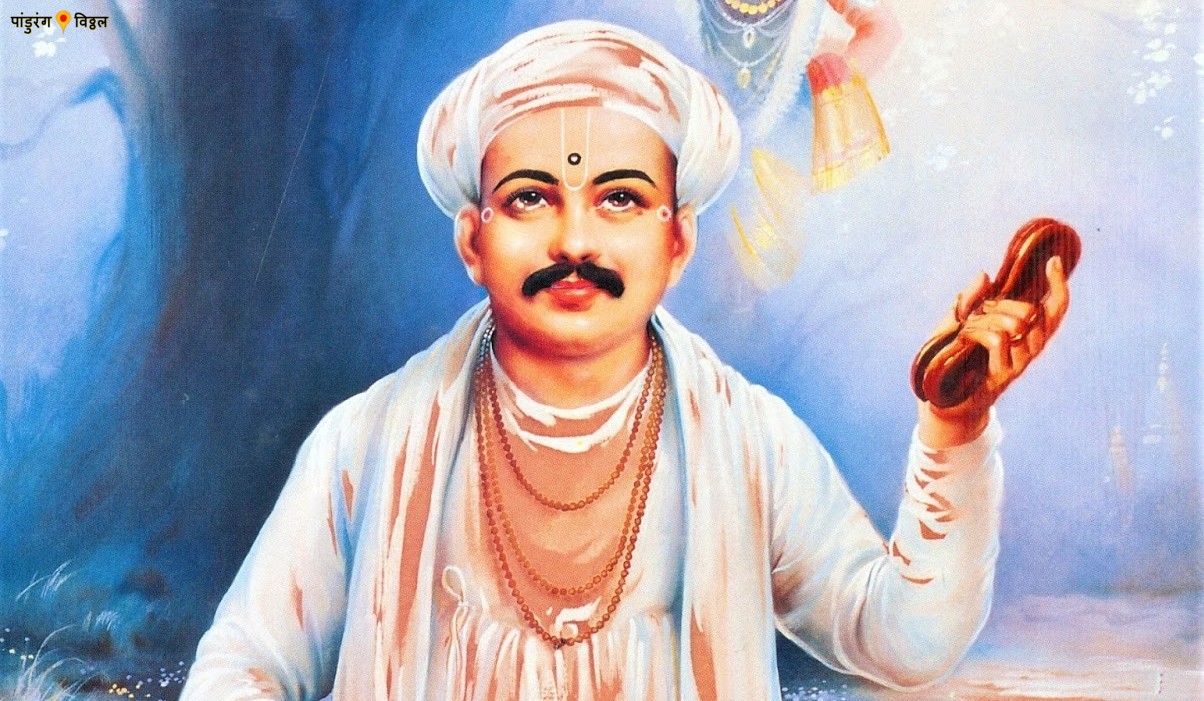Tukaram, also referred to as Sant Tukaram, Bhakta Tukaram, Tukaram Maharaj, Tukoba and Tukobaraya, was a 17th-century poet-saint of the Bhakti movement in Maharashtra.
Birth :1608
Birth Place :Dehu, near Pune Maharashtra, India.
Died : 1650
The year of birth and death of Saint Tukaram has been a subject of research and dispute among 20th-century scholars. He was either born in the year 1598 or 1608 in a village named Dehu, near Pune in Mahārāshtra, India.
Sant Tukaram was born to Kanakar and Bolhoba More, and scholars consider his family to belong to the Kunbi caste.
Tukaram’s family owned a retailing and money-lending business as well as were engaged in agriculture and trade. His parents were devotees of Vithoba, an avatar of Hindu deity Vishnu (Vaishnavas). Both his parents died when Tukaram was a teenager.
Sant Tukaram’s first wife was Rakhama Bai, and they had a son named Santu. However, both his son and wife starved to death in the famine of 1630–1632. The deaths and widespread poverty had a profound effect on Tukaram, who became contemplative, meditating on the hills of Sahyadri range (Western Ghats) in Maharashtra, and later wrote he “had discussions with my own self”. Tukaram married again, and his second wife was Avalai Jija Bai. He spent most of his later years in devotional worship, community kirtans (group prayers with singing) and composing Abhanga poetry.
According to Ranade, Tukaram’s spiritual teacher was Babaji Chaitanya, who himself was fourth generation disciple of the 13th-century scholar Jnanadeva.
According to some scholars, Tukaram met Shivaji – a leader who challenged the Mughal Empire and who founded the Maratha kingdom; Tukaram introduced Shivaji to Ramdas for his spiritual education.
In composing abhangs, Tukaram incurred the wrath of the Brahmins, who believed themselves to be the only true custodians and interpreters of religion. Not only did he dare to impinge upon this prerogative, but he wrote in Marathi rather than Sanskrit. According to legend, the local Brahmins compelled him to throw the manuscripts of his poems into the river Indrayani, and taunted him with the observation that if he were a true devotee of God, the manuscripts would reappear. It is said that Tukaram then commenced a fast-unto-death, invoking the name of God; after thirteen days of his fast, the manuscripts of Tukaram’s poems reappeared, floating on the river. Some of his detractors became his followers; and over the remainder of his life, Tukaram acquired a reputation as a saint
Tukaram’s work is known for informal verses of rapturous abandon in folksy style, composed in vernacular language, in contrast to his predecessors such as Dnyandeva or Namdev known for combining similar depth of thought with a grace of style.
In one of his poems, Tukaram self-effacingly described himself as a “fool, confused, lost, liking solitude because I am wearied of the world, worshipping Vitthal (Vishnu) just like l my ancestors were doing but I lack their faith and devotion, and there is nothing holy about me”.
Tukaram Gatha is a Marathi language compilation of his works, likely composed between 1632 and 1650. Also called Abhanga Gatha, the Indian tradition believes it includes some 4,500 abhangas.
The poems considered authentic cover a wide range of human emotions and life experiences, some autobiographical, and places them in a spiritual context. He includes a discussion about the conflict between Pravritti – having passion for life, family, business, and Nivritti – the desire to renounce, leave everything behind for individual liberation, moksha.
Numerous inconsistent manuscripts of Tukaram Gatha are known, and scholars doubt that most of the poems attributed to Tukaram are authentic. Of all manuscripts so far discovered, four are most studied and labelled as: the Dehu MS, the Kadusa MS, the Talegeon MS and the Pandharpur MS. Of these, the Dehu MS is most referred to because Indian tradition asserts that it is based on the writing of Tukaram’s son Mahadeva, but there is no historical evidence that this is true.
Scholars note the often discussed controversy, particularly among Marathi people, whether Tukaram subscribed to the monistic Vedanta philosophy of Adi Shankara. Bhandarkar notes that Abhanga 300, 1992 and 2482 attributed to Tukaram are in style and philosophy of Adi Shankara:
When salt is dissolved in water, what is it that remains distinct?
I have thus become one in joy with thee [Vithoba, God] and have lost myself in thee.
When fire and camphor are brought together, is there any black remnant left?
Tuka says, thou and I are one light.
— Tukaram Gatha, 2482, Translated by RG Bhandarkar
As was the tradition, he also added his signature, Tuka Mhane (तुका म्हणे) or “Tuka Says,” at the end of each verse. Besides the Abhangs, Tukaram wrote a quantity of other verse in a variety of forms, such as shlok, arati and gaulani. He also wrote some verse in Hindi.
In the forty-eighth year of his life, in 1649, Tukaram disappeared. There is disagreement about Tukaram’s final day. Some say that he informed his wife early in the day that he was going to Vaikuntha (the Divine Abode), and his wife laughed at him. He went up the hillock and waited for Vithoba. By that time, news had spread around Dehu and people had gathered around the hillock, waiting for the Divine event. From eyewitness accounts, a large vehicle appeared from the skies and Vithoba emerged.
Eyewitnesses rushed to Tukaram’s home and informed his wife that Tukaram was on his way to Vaikuntha, the Abode of God. His wife ran toward the hills, only to see him take off in the Viman (flying vehicle). Tukaram’s son Narayana was a great bhakta like his father.

